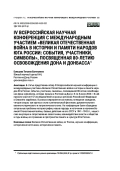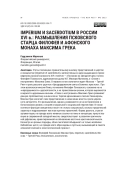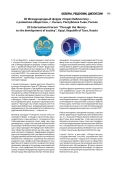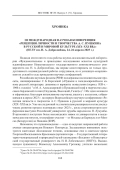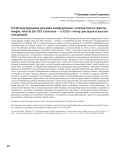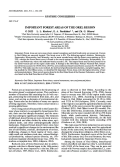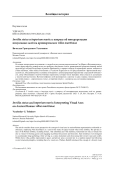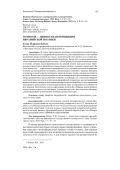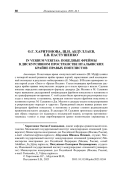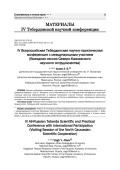В статье представлен обзор IV Всероссийской научной конференции с международным участием «Великая Отечественная война в истории и памяти народов Юга России: события, участники, символы», посвященной 80-летию освобождения Дона и Донбасса, которая прошла в Ростове-на-Дону с 5 по 8 июля 2023 г. В ней приняли участие 157 исследователей из разных регионов Российской Федерации и ближнего зарубежья. В рамках мероприятия состоялись пленарное заседание, четыре секции, три круглых стола и региональный фестиваль документального военно-исторического и патриотического кино. На конференции были обсуждены актуальные проблемы историографии, новые подходы и источники в изучении Великой Отечественной войны, боевые действия на юге СССР в 1941–1943 гг., нацистская оккупация и сопротивление захватчикам, взаимодействие власти и общества в годы войны, ее отражение в пространстве памяти и культуре Юга России
Статья посвящена сравнительному анализу представлений о царстве и священстве (imperium et sacerdotium), запечатленных в двух выдающихся произведениях русской книжности XVI столетия — «Послании на звездочетцев и латин» Филофея Псковского, адресованном дьяку М. Г. Мисюрю Мунехину, и «Слове о нестроениях» Максима Грека. В первом из них излагается идея «Москва — Третий Рим» и роль русского царя как «броздодержателя святых Божиихъ престолъ». При этом вселенская миссия Рима, по мнению Филофея Псковского, основана не на «неразрушимости» царской власти, а на православном учении, которое выражается в верности церковным канонам. «Слово о нестроениях» Максима Грека развивает данную проблематику в ином ключе. Черпая вдохновение в песнях Савонаролы, Максим Грек излагает свое представление о назначении власти и роли церковного авторитета. Его размышления, однако, развиваются не на историческом и богословском уровне, а скорее в моральной и социальной перспективе. В таком контексте функция священника носит не столько сакральный, сколько пророческий характер и подразумевает жесткую критику правителей. Форма диалога, строгая аргументация, но прежде всего неявные ссылки на темы и концепции, присутствующие в современной западной мысли, свидетельствуют о развитии оригинальной рефлексии, ориентированной на обновление восточно-христианской мысли. Несмотря на разные подходы, обоих писателей объединяет не только изобилие библейских цитат, но прежде всего образ вдовы в пустыне, вызывающий в памяти апокалиптический и эсхатологический горизонт
Для цитирования: Саая А. Б., Тулуш Н. Б. III Международный форум «Через библиотеку – к развитию общества», г. Кызыл, Республика Тыва, Россия. Труды ГПНТБ СО РАН. 2024;(4):113-114.
Подводя итоги пятого года работы научно-исследовательской лаборатории «Фундаментальные и прикладные исследования аспектов культурной идентификации» Нижегородского государственного лингвистического университета им. Н. А. Добролюбова, мы вправе констатировать не только продуктивность индивидуальной работы сотрудников, но и успешную координацию их усилий в ходе проведения научных конференций.
Целью статьи является обзор докладов, выводов и вопросов III Международной научной конференции «Святая Земля: факты, мифы, мечты (из ХІХ столетия — в ХХІ)», состоявшейся на базе Тюменского государственного университета 14 ноября 2024 г. и организованной в рамках научного проекта № 24-28-01063 «Провинциальное паломничество на Святую Землю: база данных, исследование, библиографический указатель», финансируемого Российским научным фондом. Данная конференция, ставшая третьей по счету в 2024 г., продолжила традицию междисциплинарного изучения Святой земли. С 2020 г., выступая в качестве научной площадки, аккумулировала ключевые направления современных исследований о Святой земле в разных аспектах. Святая земля как хронотоп в литературе и документах, как пространство деятельности Русской духовной миссии и ИППО, как объект иеротопии и как территория современных израильско-палестинских отношений. В рамках конференции выступили более двадцати участников из России, Беларуси и США. Были представлены исследования в области истории, филологии, культурологии, политологии, иеротопии, иудаики и израилеведения, которые взаимодополняли друг друга, способствовали комплексному осмыслению темы Святой земли в религиозной, культурной и исторической перспективах и расширили методологические горизонты изучения. Наиболее масштабной стала дискуссионная панель «Святая Земля в русской литературе и паломнических текстах», в докладах которой подчеркивалась важность культурно-исторического подхода. Панель «Иерусалим в истории и культуре: образы, символы и художественные интерпретации», в отличие от первой, сосредоточенной на русских паломниках и источниках, делала акцент на международных, кросскультурных и исторических трансформациях Иерусалима. Она объединила доклады по теме истории символа в мировой культуре с использованием различных научных подходов. Также были представлены две дискуссионные площадки об истории и личностях Русской духовной миссии в период с XIX по XX вв. В заключение конференции был проведен круглый стол «Паломнические практики рубежа веков: экономика, транспорт и повседневность», на котором участниками были актуализированы такие вопросы, как портретирование паломника; сохранность документов в регионах; тенденции изменения паломничества, связанные с развитием социокультурных и экономических условий; роль транспорта в изменении традиционных представлений о паломничестве. Конференция подтвердила устойчивую тенденцию к углублению междисциплинарного диалога и расширению нарративного спектра в изучении Святой земли.
Important Forest Areas are core areas where natural complexes and their biodiversity are preserved. Forests in Orel Oblast are unevenly located. The forest cover is 8%. The following region’s districts, Dmitrovsky, Znamensky, Khotynetsky, and Mtsensky, are the most wooded ones with the forest cover making up 20 to 25%, whereas the lowest forest cover is found in the south-eastern districts Dolzhansky, Kolpnyansky, Livensky, and Pokrovsky, where this indicator barely exceeds 2.5%. The largest forest area has been preserved in the north-western part of the region under study. It belongs to the Orlovskoye Polesye National Park. Broadleaved forests account for 19243.42 ha (19.5%), and coniferous/broad-leaved forests account for 79,459.17 ha (80.5%). This study uses the route method, the method of geobotanical descriptions, and grid mapping. Having studied the Orel Oblast areas, we identified 34 Important Forest Areas with the highest diversity of rare and protected plants. There were 8 species listed in the Red Data Book of the Russian Federation, and 58 species listed in the Red Data Book of Orel Oblast
На основе литературных источников и с опорой на результаты раскопок виллы Сан Марко в Везувианском регионе формулируется новый взгляд на проблему визуальных осей в древнеримской репрезентативной жилой архитектуре поздней Республики и раннего Принципата, в первую очередь на приморских виллах нобилитета (villae maritimae, villae otium). В полемике с Уоллесом-Хэдриллом и его представлением о фронтальной визуальной оси, объединяющей все основные помещения и демонстрирующей перспективу социальной мобильности, автор обосновывает наличие боковых перспектив, которые могли вызывать иные смыслы и ассоциации у посетителей (суггестии). Всё многообразие осей группируется в систему из двух главных типов перспективы: invidia (status) – «претензия на статус», и imperium (maris) – «контроль над состояниями природы».
Role clarity and workplace autonomy are always considered a dilemma for employees to perform better to achieve their desired targets, which can affect organizational performance. The purpose of this research is to investigate the effect of role clarity and work autonomy on the performance of employees with the mediating influence of organizational commitment. Classical organization theory and role theory constitute the methodological framework of the study. Structural equation modelling and confirmatory factor analysis were used as research methods. Data is gathered from 311 employees of five different multinational telecommunication organizations operating in the Federal Capital Territory (FCT) Islamabad and Rawalpindi City, Punjab, Pakistan through a convenience sampling. We used AMOS for data analysis. The research results revealed that role clarity and work autonomy have a significant positive effect on the work performance of individuals. Similarly, organizational commitment demonstrated the partial mediation between the association of role clarity and work autonomy with work performance among employees of multinational telecommunication organizations. Employees who are uncertain about their job responsibilities are unable to be engaged and motivated at work. Organizations, therefore, should eradicate role ambiguities and conflicts to boost staff commitment by propping a clear role for the enhancement of work performance. This research extends the role theory, and our findings can give companies insights into how to customize autonomy levels for maximum productivity.
В статье представлена проблема разграничения понятий ивуаризма, ивуарийскости, ивуарийской идентичности, рассматриваемая с точки зрения восприятия данных понятий не только с политической точки зрения, но и с точки зрения искусства, в частности современной литературы. Кроме того, в статье представлен обзор современной ивуарийской поэтики с точки зрения реализации концептов ivoirité и ivoironie, которые не разграничиваются на данный момент в русском языке. Определение идентичности ивуарийского народа представлено с позиции творчества То Би Тьен Эммануэля — современного ивуарийского поэта, который дал жизнь пониманию ivoironie как положительного концепта, обозначающего единение с народом, бережное отношение к своей и другим культурам, гордость за свою землю, которая воспевается в стихах. В качестве основного результата исследования можно рассматривать попытку автора разграничить представленные понятия, основываясь на понимании ивуарийской идентичности поэтов и прозаиков ивуарийской литературы, рассматривающей принадлежность к нации не как главенствующую идею ксенофобии, но как стремление подчеркнуть свою самость в многонациональном мире, где признаются особенности всех народов. Поэтические тексты современных гриотов Кот-д’Ивуара демонстрируют неподдельную гордость за свой народ, а языковые средства, используемые авторами, сконцентрированы на повторении основных ценностных идей.
В настоящее время «популистский момент» (Ш. Муфф) совпал с четвертой волной развития крайне правых партий, нарастивших свой коалиционный потенциал в результате мейнстриминга (К. Мюдде). В Италии примерами таких партий стали «Лига» и «Братья Италии». Статья посвящена проблематике дискурса крайне правых популистских лидеров до и после прихода к власти. Сделана попытка определить выигрышную формулу дискурса Дж. Мелони и М. Сальвини через выявление дискурсивной конфигурации фреймов популизма и нативизма и их трансформацию во времени. С этой целью были критически рассмотрены подходы к популизму и нативизму, проведен контент-анализ фреймов популизма и нативизма в речах М. Сальвини и Дж. Мелони и дискурс-анализ конструирования и репрезентации «народа» и «других». Проведенный анализ выявил разные конфигурации фреймов популизма и нативизма и разные степени радикализации правопопулистского дискурса. В дискурсе М. Сальвини произошла трансформация образа «народа» (от паданцев к итальянской нации), которому противопоставлялась «элита» в лице евробюрократов (ранее политические управленцы в Риме) и группа «ненарода» – иммигранты, прибывающие, прежде всего, из Азии и Африки и исповедующие ислам. В дискурсе Дж. Мелони сменились акценты с символического на экономический нативизм и шовинизм благосостояния, на место «борьбы» с «чужими» пришла проактивная позиция перераспределения благ и поддержки законности и правопорядка. Показано, что формула успеха Дж. Мелони заключалась в постепенной дерадикализации крайне правого дискурса и исключении из него неключевых и противоречивых вопросов.
Актуальность темы обусловлена тем, что в условиях цифровизации экономики вопросы обеспечения экономической безопасности организаций приобретают особую значимость. Развитие информационных технологий создает как новые возможности для защиты экономических интересов организаций, так и новые угрозы, требующие комплексного решения. Существующие методы обеспечения экономической безопасности нуждаются в модернизации с учетом растущего влияния цифровых технологий. Необходимо исследовать эффективность применения IT-решений для защиты экономических интересов предприятий в условиях цифровой трансформации экономики. Целью исследования является анализ возможностей использования IT-технологий для повышения уровня экономической безопасности организаций. Анализ современных тенденций показывает, что внедрение IT-технологий позволяет существенно повысить эффективность систем экономической безопасности
Данное сообщение посвящено научному мероприятию, которое проводится ежегодно на Северном Кавказе с 2014 г. Показано, что на протяжении 10 лет Тебердинская конференция стала престижным научным мероприятием, в котором принимают участие ученые, специалисты различных направлений, в том числе междисциплинарных, из России и зарубежных стран, изучающие горные эко-системы и их географические проблемы.
